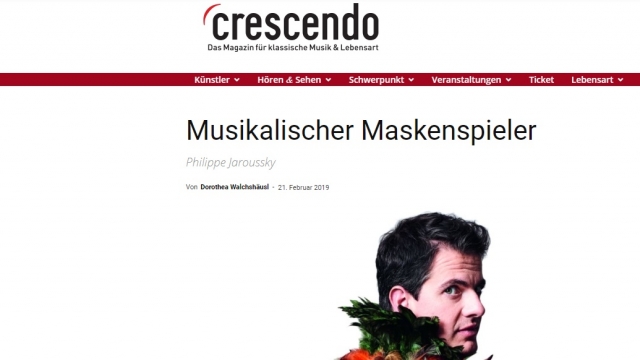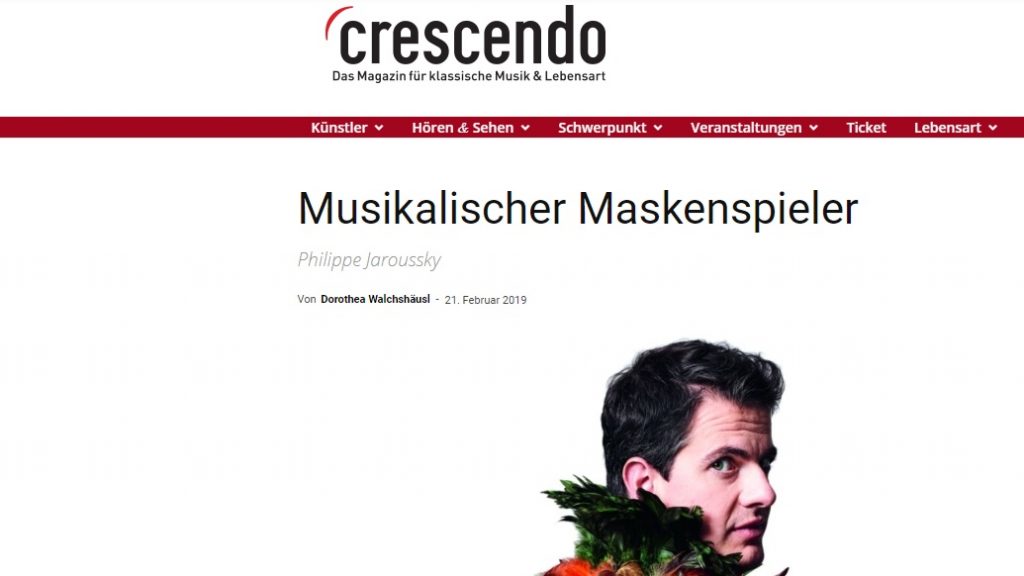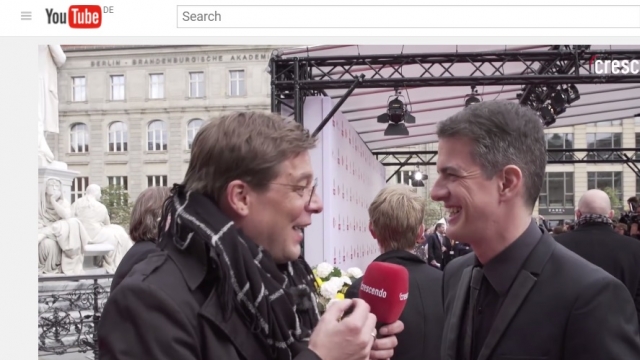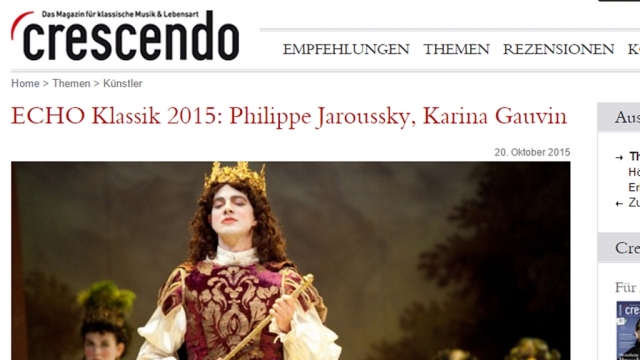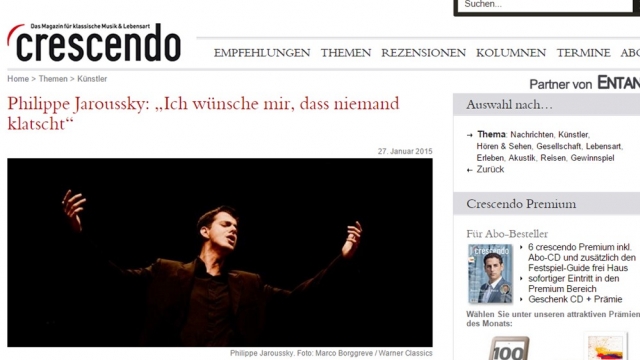2019-02, Concerti, by Dorothea Walchshäusl
“Listening to Cavalli, it’s astounding how candid and courageous the material is. Despite all the tragedy, the pieces are full of humour and, by the way, they are are very sexually explicit – one part in the love duet, unequivocally, is about sex (laughs). Which means: the music is almost 400 years old; however, sometimes there’s more freedom there to be found than in our present time. That’s incredibly exciting. “
Translation to English
This is a fan translation; no infringement of copyright is intended. We believe it fulfills the criteria for “fair use,” discussion and study. Translation by *L
Musical Mask Player
Philippe Jaroussky
By Dorothea Walchshäusl – February 21, 2019
Philippe Jaroussky’s play with parody and irony in Venetian opera
With his warm countertenor voice, Philippe Jaroussky has sung his way to the top. On his new album, the 41-year-old artist now devotes himself to the Italian composer of early Baroque Francesco Cavalli, and fascinates with an exciting musical masquerade. A conversation about the creative sound-creator, new forms of masculinity and carnival in Venice.
CRESCENDO: You once called the countertenor Fach a new form of masculinity. What do you mean by that?
Philippe Jaroussky: I do believe that the countertenor is a symbol for a new form – or rather, a new old form (laughs). The division of the voices into female and male Fachs arises from the romantic categorization. The castrato voice always stood out as a special kind of voice. However, the castrati quite absolutely interpreted very strong characters. They had high voices, but that didn’t mean they didn’t take on male parts as well. It is certainly no coincidence that after the end of the Second World War, the countertenors suddenly played a role again. The war had been so terrible that people no longer wanted the rigid role models – the man who goes to war, and the woman stays at home with the children. The rediscovery of the countertenor and of high voices in music was a way to say: Women can be strong and men can show their sensitive side. A man can cry and a woman can fight.
You have discovered your voice relatively late as your instrument. How did that feel?
When I started to sing, I suddenly felt a great freedom. I had to fight much less than with the violin, but at the beginning I also felt veritably naked. After all, you cannot hide behind your instrument. But I worked hard, and found great fulfillment in singing. I never wanted to be a, or sing like a woman. The countertenor range is just the voice I feel at home with.
“When I started to sing, I felt veritably naked.”
As an opera singer, you dive into new characters again and again. How are you feeling about that?
We opera singers are sometimes almost too busy merging with a certain role. For me, the most important thing is to achieve a connection to the music. The music should influence how I sing, and not the other way around. When I’m learning a new role, I start with the score and let the feelings the music triggers in me pass into my voice. It’s a very intuitive process and sometimes exciting new things come of it: a really fast-paced aria gains a certain sweetness, or a slow aria gains something very dominant.
On your new album, you will be able to devote yourself to various arias and duets by Francesco Cavalli. Additionally, there are richly orchestrated orchestral works. How did you come across this composer?
My first contact with Baroque music in the opera was Monteverdi. Shortly afterwards, I discovered Cavalli’s music, and from the beginning, was fascinated by the variety of timbres, contrasts and moods. The collaboration with Gabriel Garrido and René Jacobs was pivotal for me as well. I learned so much from them and discovered how rich Cavalli’s music is. With only a few notes, he creates wonderful melodies full of charm. The operas of Cavalli have great dramatic potential, and with good reason, they are being playing extensively at many opera houses for several years now.
“Cavalli operas have great dramatic potential”
The operas of Cavalli were mainly on scheduled for Carnival time in Venice. Have you ever experienced the Venetian Carnival yourself?
I’ve been to Venice many times, but never during carnival. And I’m not sure that nowadays’ version truly represents what it used to be like. However, on myalbum, I wanted to highlight the contrast of the time. On the one hand, carnival was a moment of abundance and luxury, but at the same time there were also a grim side to it. After all, there were plenty of illnesses at the time, as well as severe epidemics like the plague. All the more, people wanted to enjoy life right now, because they did not know whether they would live to enjoy another year. Cavalli’s music reflects exactly that. Both sides – the light and the dark mask, the wealth, the poverty and death – are present in his operas. I wanted that yin and yang represented on the album. Carnival was the time of the year when people behind their masks were all on one level. That’s the reason for its great social significance. The rich could go incognito; the poor were a little less poor and everyone celebrated together.
“One possible lesson from Cavalli is: We should all be much freer and braver, and complain and lament less.”
Cavalli was a pupil of Monteverdi. How independent is his music?
First of all, it is clear that Monteverdi has created a style. Cavalli does not change it, but he remains faithful to the school of Monteverdi. However, during Cavalli’s time, there had been a substantial change: The first public theaters were opened! Until then, opera had been an entertainment exclusively for the rich. rich people. Cavalli now made opera accessible to everyone, and that’s probably why humor and comedy play such a big part in his music. Cavalli didn’t only want to portray kings and princes – he wanted to show people’s everyday lives and truly represent society including the common people.
His operas feature a multitude of different characters, and you can veritably feel the Venetian society. In this respect, only Cavalli finally made the style of Monteverdi really popular, and his catchy melodies resemble today’s pop music. Listening to Cavalli, it’s astounding how candid and courageous the material is. Despite all the tragedy, the pieces are full of humour and, by the way, they are are very sexually explicit – one part in the love duet, unequivocally, is about sex (laughs). Which means: the music is almost 400 years old; however, sometimes there’s more freedom there to be found than in our present time. That’s incredibly exciting.
Sometimes I feel like we’re getting less and less free. One possible lesson from Cavalli is: We should all be much freer and braver, and complain and lament less.
Source/Read more: [x]

